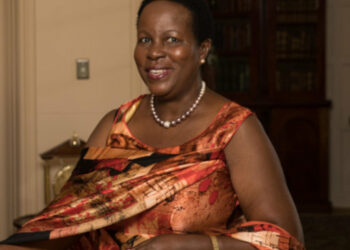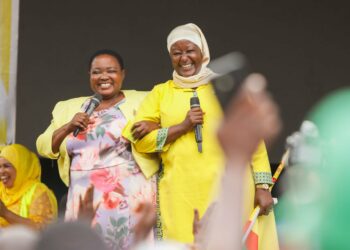By Mike Ssegawa
Journalist Moses Kizito Buule invited me to meet two young men. He told me they were doing an incredible job in Katosi with children and women who are orphaned or widowed by HIV/Aids or the ‘lake’.
I could not understand how the “lake” orphaned or widowed anyone until he explained the lives of young men who drown in Lake Victoria either due to accidents or when running away from enforcement officers who arrest them for fishing immature fish.
“The lake is a death trap for several youth here,” Buule who has spent years reporting in Mukono, Buikwe and Kayunga districts, says. It is in the course of his work that he met Tony Kabuye and Henry Nsubuga who in his opinion were giving their community a meaningful service.

[button color=”orange”]“They are giving back dignity to the children and women left behind by their deceased beloved ones,” he told me.[/button]
Going to Katosi
The newly laid Mukono-Katosi tarmac to the shores of Lake Victoria, is an unforgettable ride as one drives through a fertile green stretch from Kyetume turning off in Kisoga trading centre towards Katosi. This lake side has for a long time been a source of sand used in Kampala construction sites and fish supplied to fish factories, some of which have closed as fish stocks was depleted due to overfishing.

This Mukono-Katosi road was a painful dusty and potholed road just a couple of years ago and has become national famous due to the corruption that has followed the procurement of the companies constructing the road. The dusty pothole road made this part of the country inaccessible, rural and remote, yet it was about 50km from Kampala city centre. With the new road, Katosi has become so “near” that within 20 minutes, you can drive comfortably from Mukono Municipality to Katosi.

The story of Katosi road opening and giving a new life to this township on the shores of Lake Victoria has parallels with Katosi Inter-community Development Alliance (KIDA), a development vehicle being run by two young men and a woman. KIDA started in 2012 but was registered in 2015.

On a Thursday morning, a day before World Aids Day of December 1, which fell on a Friday, I joined Tony and Henry to visit St John Bosco Nursery and Primary school.

This is one of projects the duo have brought to life in their work to bring about positive social change in their community. Tony believes that that education is a social and economic equalizer. He adds that through effective community organization and skilling, widows and vulnerable children can become better people.
Listening to Kabuye, a counseling graduate share the story of how their community based organization, KIDA started, I could not stop admiring the courage of the young people who dream of changing the fortunes of children in the place they were raised. Kabuye and Henry say both were hopeless children in this area, taken care of by distant relatives. They realized that education and self help income projects helped them turn the course of their history.

That is how they started volunteering with organizations that support people to realize their potential. Among the organizations was Step Up Uganda, a US-based NGO.
Then, Step Up closed their activities in Katosi and community they worked with became more hopeless. It forced them to desire to end the suffering by starting an organization that can step into those big shoes.
Kabuye says that when Step Up Uganda was unable to continue supporting needy people in Uganda due to certain hindrances, it handled over the projects to us, which forced them to register a formal organization. However, Kabuye emphasizes, they have continued to work with some people who were part of Step Up Uganda.
[button color=”orange”] “We realised we are not alone. We know many people who are like us having a hard life,” Kabuye says. Nsubuga adds, “We didn’t have school fees, and many children today are like us we were.”[/button]
While at John Bosco P/S now their biggest project so far, made possible with assistance by a Germany based charity Visions for Children, I sense in them a thirst to do more. The school has 170 children, eight teachers and sits on three acres of land.

Yester-months, St John Bosco was an education centre with children sitting in classrooms made of timber. The little ones also sat in mud and dust from morning to evening. Today, thanks to Visions for Children, and a few contacts in KIDA network, they have built a seven classroom block for the school. A complete makeover for the school which was shunned for its odd look rather than its mission to look after disadvantaged children in the community has since gone. Now, even with eight teachers, the school is an envy of Katosi, undoubtedly the most beautiful classrooms infrastructure in Katosi. This year, six children have sat their Primary Seven, and this is only the beginning of the long journey.
“We thank Visions for Children for supporting our vision to provide safe learning environment for vulnerable children in remote areas of Uganda, and to support our program of providing elementary education support for orphans and vulnerable children,” says Kabuye, with a smile on his face. He told this website that without Visions for Children, this reality would still be a dream.
A unique school
Children who attend St John Bosco are not ordinary children. They have seen it all – in terms of sorrow and suffering.
Some have never seen their parents who died of HIV/AIDS, or single parents who have no time for them as they are busy searching for the livelihood.
This school St John Bosco, has been taking care of children of widows, and grandma left with the burden of children whose parents have either abandoned them or actually died.
The location of St John Bosco is what you can call a perfect picturesque, overlooking the Lake Victoria which sits gallantly in the valley. The cool lake breeze blows over the hills where the school sits. Certainly the same wind could mean sickness for some of the children who report to school in torn uniforms, barefoot and have never wore a sweater or jacket on their skinny bodies.
For several years, these children sat in these dusty classrooms. This is the kind of school which fit their lifestyle, accepted and not discriminated against due to their economic and social status.

These are orphans and vulnerable children who cannot afford to pay fees in nearby private schools such as Paul Mukasa Primary School which is owned by the former member of parliament for the area (Mukono South) Mr Bakaluba Mukasa. There also three government aided schools in the locality famed for not poor teaching children save for playing and rampant absenteeism as children for lack of supervision run away and join other men on the lake as fishermen or fishmongers, the main stay of Katosi township, which creates a cycle of burdens which KIDA is fighting now including poverty, lack of life and job skills, illiteracy, ill health and other risks to life due to the lifestyle of people in this part of the country.
When their husbands die; women and children face a double jeopardy as men are the bread winners for fishing communities.
KIDA works with about 70 women in Katosi, to carry out income generating projects, and most of the skills are taught by KIDA, who have rented a place in Katosi trading center and set up a skills training center for tailoring, and business administration courses among others.
KIDA have plans of expanding the skills training center to accommodate orphans and vulnerable children who might not get a chance to further their studies, and this would look at the need in the entire country. With the nation-wide skills training and support center, says Kabuye, they can produce self employed trainers who can pass on skills to others.
“In Uganda today, the need is not to ensure that all children reach Universities but to have them know how to read and write, and then learn a practical skill(s) based on their ability and interest”.
[button color=”orange”] “The skills training targets primarily children who are school drop outs, teenage mothers, and jobless youth,” Nsubuga says.[/button]
St John Bosco rises
“Primary is a very good foundation for children,” says Kabuye, who spends a lot of his time driving between Mukono and Katosi to follow up on a number of program for their organizations.
Kabuye says the success of their project is because they work closely with local leaders and residents who decide what they want them to do.
This development model, according to Kabuye, has enabled them involve the community to contribute even in their small ways to the projects they run in the area.
“We don’t have a scholarship program, but, we ensure that vulnerable children we have identified get free education in schools we work with,” Kabuye adds. Nsubuga adds that this is participatory development model which ensures that even without them, the community can still identify needy children and present them to the schools KIDA helped build for consideration for free education.
[button color=”orange”] “It is sustainable”, Kabuye says, adding “there are projects you invest in but aren’t sustainable.”[/button]
He emphasizes that investing in education stands for years through the generation of beneficiaries.
Ms Namulugo Josephine, a Primary Two teacher at St John Bosco says KIDA has done their school a lot of good as children are now gaining self confidence among their peers who used to mock them for studying in shacks.
Namulugo who has 20 children in class says now they have to work on having parents and guardians of the children to pay more attention to the learning of their children, which she says they don’t do.
[button color=”orange”] “When they send children to school, that is it. They expect teachers to do the rest.”[/button]
Namulugo also says since the school was opened mid this year, they have started getting more children.
KIDA is a Community based organization. As a development engine, it works with organized community groups comprising youth and women.
“We don’t want to waste resources,” Kabuye insists as he tells me the seven classrooms cost them about sh180 million. The classrooms also followed the specifications recommended by the Ministry of education including fitting ceilings, big windows, two blackboard, and desks for 25 children.
Before I call it a day, Henry shares their organisation’s website; https://www.katosi-community.
Do you have a story in your community or an opinion to share with us: Email us at editorial@watchdoguganda.com











